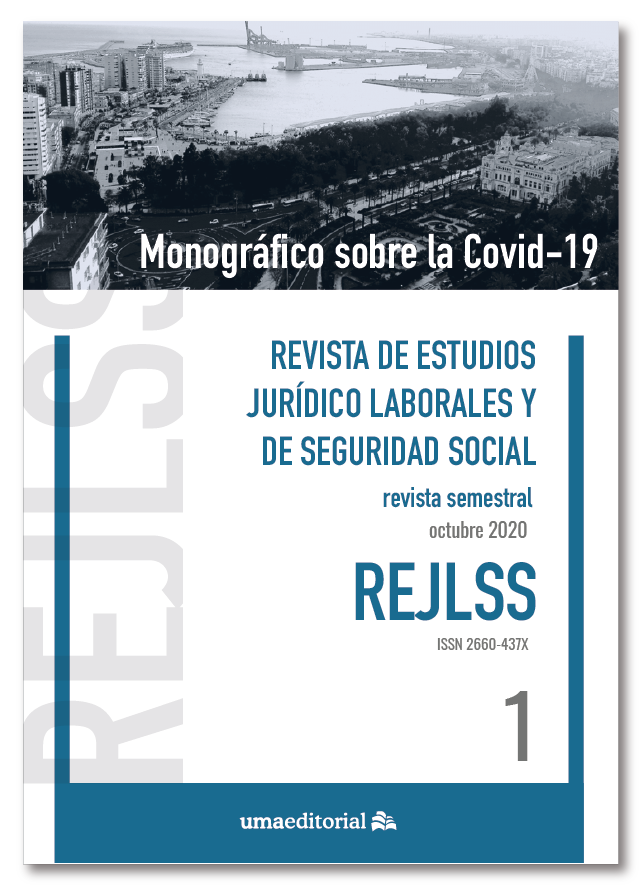Towards the recovery of vocational training for presential employment
The Employment Training System
DOI:
https://doi.org/10.24310/rejlss.vi1.10443Keywords:
synchronous character of training, catalog of training specialties, certificate of professionalism, skills, responsible statement of training accreditation, training system for employmentAbstract
The work analyzes and assesses the current System of Vocational Training for Employment in Spain, from a legal point of view. The analysis of regulations advances from the first agreements highlighting the importance of Vocational Training for Employment and that they contemplate the bases , to the various additions and developments that have occurred over time, with special incidence on the current situation COVID, which has led to a paralysis of the Training System, and adaptation of it through extraordinary measures to reactivate the Professional Training courses for Employment in person.
Downloads
Download data is not yet available.
Metrics
Metrics Loading ...
References
Foncubierta Rodríguez, M.J., “Formar en competencias para el empleo: reflexiones basadas en un estudio entre pequeñas empresas del campo de Gibraltar”. Escuela Universitaria “Francisco Tomás y Valiente”, adscrita a la Universidad de Cádiz. Algeciras. Facultad de Educación. UNED Educación XX1. 13.1, 2010, pp. 81-99.
García Ruiz, M. R., “Formación y empresa: análisis de la situación de los beneficiarios de la formación continua”. Universidad de Cantabria Facultad de Educación. UNED Educación XX1. 9, 2006, pp. 165-182.
García Ruiz, M. R., “Formación y empresa: análisis de la situación de los beneficiarios de la formación continua”. Universidad de Cantabria Facultad de Educación. UNED Educación XX1. 9, 2006, pp. 165-182.
Downloads
Published
2020-10-15
How to Cite
Poyatos Chacón, M. F. (2020). Towards the recovery of vocational training for presential employment: The Employment Training System. Journal of Labor and Social Security Legal Studies (REJLSS), (1), 296–311. https://doi.org/10.24310/rejlss.vi1.10443
Issue
Section
Tribuna de Actualidad
License
In the Revista de Estudios Juridico Laborales y de Seguridad Social (REJLSS) we are clearly committed to a policy of open access to scientific knowledge (See Berlin Declaration).
Those authors who have publications with this journal accept the following terms:
This journal provides immediate free access to its content under the principle of making research freely available to the public. All the contents published in the REJLSS are subject to the Creative Commons license
Attribution-NonCommercial-NoDerivatives 4.0 International (CC BY-NC-ND 4.0)
Copyrights are of two kinds: moral and patrimonial. Moral rights are perpetual, inalienable, non-transferable, inalienable, unattachable and imprescriptible prerogatives. In accordance with Spanish copyright legislation, the authors who publish in REJLSS retain the moral right over their work, as well as the ownership of the patrimonial right, which will be transferred to the University of Malaga for its dissemination in open access.
The patrimonial rights, refer to the benefits that are obtained by the use or disclosure of the works. REJLSS is published in open access and is exclusively authorized to perform or authorize by any means the use, distribution, dissemination, reproduction, adaptation, translation or transformation of the work.
It is the responsibility of the authors to obtain the necessary permissions of the images that are subject to copyright.
Authors whose contributions are accepted for publication in this journal retain the non-exclusive right to use their contributions for academic, research and educational purposes, including self-archiving or depositing in open access repositories of any kind.
The electronic edition of this magazine is edited by the Editorial of the University of Malaga (UmaEditorial), being necessary to cite the origin in any partial or total reproduction.
The authors may adopt other non-exclusive license agreements for the distribution of the version of the published work (eg: deposit it in an institutional telematic archive or publish it in a monographic volume) provided that the initial publication is indicated in this magazine.
Authors are allowed and recommended to disseminate their work through the Internet (eg, in institutional telematic archives or on their website) before and during the submission process, which can produce interesting exchanges and increase citations of the published work.






19.png)
